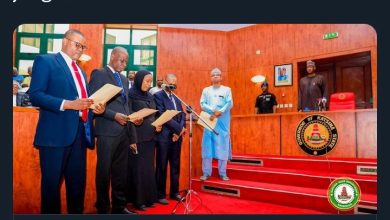4 Current Female Prime Ministers in Africa

In a world where leadership has predominantly been associated with men, it is inspiring to witness the rise of female leaders taking the helm in various countries. Africa has seen a significant rise in the number of women holding positions of power and leadership, by appointing female prime ministers to lead their nations. These trailblazing women have demonstrated exceptional capabilities and have become role models for aspiring female leaders across the continent. According to Africa.com we will explore the female prime minister who are still in office.
Namibia – Saara Kuugongelwa-Amadhila
According to Wikipedia, Saara Kuugongelwa-Amadhila, born on October 12, 1967, is the current Prime Minister of Namibia, a position she has held since March 21, 2015. She is a member of the South West Africa People’s Organization (SWAPO), the ruling party in Namibia. Prior to becoming Prime Minister, Kuugongelwa-Amadhila served as the Minister of Finance from 2003 to 2015. She holds an Honorary Doctorate in Public Finance and an MSc in Financial Economics, which she obtained from Lincoln University in Pennsylvania, United States.
Kuugongelwa-Amadhila began her career as an economist in the Office of the President under President Sam Nujoma. In 1995, at the age of 27, Nujoma appointed her to parliament, making her one of the youngest members of parliament in Namibia’s history. She also held the position of Director General of the National Planning Commission. In recognition of her expertise and dedication, Nujoma promoted her to the position of Minister of Finance in 2003. Her impressive track record in finance and economics paved the way for her historic appointment as Namibia’s first female Prime Minister.
Togo – Victoire Sidémého Dzidudu Dogbé Tomegah
According to Wikipedia, Sidémého Dzidudu Dogbé Tomegah, born on December 23, 1959, became the Prime Minister of Togo on September 28, 2020. She holds the distinction of being the first woman to hold this position in Togo. Prior to her appointment, Tomegah Dogbé served as the Minister of Grassroots Development, Handicrafts, Youth, and Youth Employment in the government of Komi Sélom Klassou. She also held the position of Cabinet Director for President Faure Essozimna Gnassingbé.
Tomegah Dogbé’s political career began in 2010 when she was appointed as the Minister of Grassroots Development, Youth Craft, and Youth Employment. She continued to serve in various ministerial roles in subsequent governments, demonstrating her commitment to grassroots development and youth empowerment. Following the resignation of Komi Selom Klassou, President Faure Gnassingbé appointed Tomegah Dogbé as the Prime Minister of Togo.
Uganda – Robinah Nabbanja
Robinah Nabbanja, born on December 17, 1969, holds the distinction of being the first female Prime Minister of Uganda. Nominated to the office on June 8, 2021, and formally confirmed by Parliament on June 21, 2021, she succeeded Ruhakana Rugunda. Before assuming the role of Prime Minister, Nabbanja served as the State Minister of Health for General Duties in the Ugandan cabinet.
Nabbanja’s journey in politics began in 2011 when she successfully contested for the position of Kibaale District Women Representative in the 9th Parliament of Uganda. She continued to represent the district in subsequent parliaments and played an active role in advocating for the welfare of her constituents.
With a background in education, Nabbanja has played a vital role in shaping Uganda’s education policies. She holds certificates and diplomas in leadership, management, and development studies. She obtained her Bachelor’s degree in Democracy and Development Studies and her Master’s degree in Development Studies from Uganda Martyrs University.
Tunisia – Najla Bouden
Najla Bouden, also known as Najla Bouden Romdhane, was appointed as the Prime Minister of Tunisia on October 11, 2021, making her the first female Prime Minister in Tunisia’s history and the entire Arab world. Bouden is a distinguished geologist and university professor, bringing a unique perspective to the political landscape of Tunisia. She previously served in the education ministry in 2011 and held senior roles at the Tunisian Ministry of Higher Education and Scientific Research.
Bouden’s educational background is marked by her engineering degree from ESTP Paris and her doctorate in geology from Mines ParisTech. Her expertise in earthquake engineering and her experience in the field of higher education and scientific research have positioned her as a prominent figure in Tunisia. In 2016, she was entrusted with the responsibility of leading the World Bank-funded program “PromEssE,” which aimed to reform and modernize university education in Tunisia to address the issue of unemployment among graduates. President Kais Saied appointed Bouden as Prime Minister during a period of political crisis in Tunisia.
Dee_blog (
)





